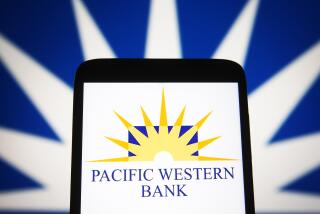PSA Will Continue as an Independent, Chairman Insists
- Share via
SAN DIEGO — Paul Barkley is now used to the question that everyone is asking everywhere he goes and after every speech he gives as chairman of San Diego-based PSA Inc.
And the answer, at least for now, is always the same.
Pacific Southwest Airlines has received “no calls, no letters, no offers” from larger trunk carriers, Barkley said during a speech Saturday in Los Angeles before the Aviation-Space Writers Assn. “I don’t see any reason why a strategically sound, midsize airline can’t be a successful player in this industry for years to come,” Barkley said.
“The management of PSA believes that we can succeed independently, (and) we are managing the company based on this belief,” Barkley said.
American Airlines’ proposed acquisition of AirCal would cast Pacific Southwest Airlines as the sole regional airline flying in the hotly competitive California corridor, a role that Barkley relishes.
Despite persistent industry rumors that midsized airlines are “helpless sparrows” that will be gobbled up by “a pack of circling cats,” Barkley is arguing that PSA lacks the “synergies” that would attract a suitor with “an offer we can’t refuse.”
But some airline industry analysts doubt Barkley’s contention that PSA will remain independent.
The airline’s managers “can’t stop the (merger) avalanche with their bare hands,” said Louis Marckesano, an airline industry analyst with Janney Montgomery Scott in Philadelphia. “There’s only a limited amount of time before (PSA is acquired).”
Marckesano predicted that Northwest Orient is PSA’s most likely suitor, now that American is acquiring AirCal and Delta is completing a bid for Western. PSA already has signed a marketing agreement with Northwest, a Minneapolis-based airline that earlier this year acquired Republic Airlines.
PSA has been “asked to dance, perhaps not as permanently as some (other regional airlines), but they have been asked to dance by Northwest, and they’re pretty well tied in with Northwest,” said Marckesano, referring to the marketing arrangement.
“It’s only a matter of time before a more concrete arrangement comes into play there,” he predicted. “Northwest is still absorbing Republic so I wouldn’t be surprised if they can work something out later on.”
PSA, with its high-frequency scheduling, is positioned to “survive the consolidation mania” because it has a relatively low cost structure and is drawing more passengers through recent marketing alliances with Northwest and Air Canada, Barkley said.
“PSA easily could survive because most of its traffic is not generated by connecting flights but rather by point-to-point stuff,” suggested Michael J. Boyd, president of Regional Airline Management Systems, a Denver-based consulting firm.
Boyd predicted, however, that United Air Lines--which on Monday said it will increase service in and out of Los Angeles--probably will respond to American’s acquisition of AirCal with a fare war that could bleed PSA, an airline that, because of past fare wars, has not logged a profit since 1979. PSA Inc. has carved out profitable years thanks to strong performances by its oil and airplane service segments.
Boyd said, “For passengers in California, the (American/AirCal merger) bodes well because I suspect United will not take kindly to American’s arrival, and PSA could be squeezed out on fares or frequency” in the already hotly competitive California corridor.
Marckesano predicted that California air travelers will benefit from ongoing merger activity that eventually will produce “seven or eight major airlines that, theoretically won’t be confined to a particular region or area of the country. That means people will have more access to other parts of the country and less problems with connecting flights.”
Boyd speculated that American pursued AirCal instead of PSA because “it represented a better value for the dollar. AirCal couldn’t bargain as strongly as PSA, so AirCal saw itself as the odd man out somewhere down the line.”
Oddly enough, Boyd suggested, PSA might benefit from AirCal’s acquisition because “they’re now a more attractive takeover candidate than they were a week ago.”
PSA will hold a special shareholders meeting this morning to change its corporate name to PS Group. The name change will distance the company from its airline subsidiary, which earlier this year went public on its own with a stock offering.
More to Read
Inside the business of entertainment
The Wide Shot brings you news, analysis and insights on everything from streaming wars to production — and what it all means for the future.
You may occasionally receive promotional content from the Los Angeles Times.









